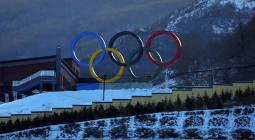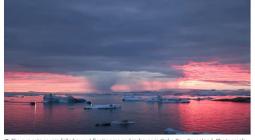Snowfall in Davos belies climate change toll across Europe
Number of snow days in the Alps has fallen more in the past 20 years than over the previous 600
Heavier snowfall ahead of this week’s World Economic Forum at Davos belied a broader downturn in snow coverage across Europe in recent years.
The high-altitude resort had about 80cm of snow at the bottom ski lift on Friday compared to 55cm on average for January, according to Davos-based climate scientist Christoph Marty at the WSL Institute of Snow and Avalanche Research. But ski towns just a few kilometres away were suffering a dearth of snow as a result of climate change.
“We have above-average snow in Davos, but if you go 12km lower down, you have below-average [snow coverage],” said Marty. “It shows how vulnerable the snowpack is to temperature [rise].”
Temperatures in Switzerland and other Alpine areas are rising faster than the global average rate. Average temperatures in the Alps have risen almost 2C from pre-industrial levels, the Research Center for Alpine Ecosystems estimates, well above the long-term global figure of at least 1.1C.
The rise is amplified in mountain regions, since warmth leads to shrinkage in areas covered with ice and snow, which would normally reflect the sun’s rays. Instead, underlying rock and vegetation absorb the sun’s heat and contribute to even more melting.
According to an FT analysis of National Snow and Ice Data Center data, overall snow cover in Switzerland has fallen almost 8 percentage points when comparing three-year averages straddling the 2002-03 to 2004-05 seasons with the 2020-21 to 2022-23 seasons.
The data shows that snow cover has fallen significantly across much of central and eastern Europe in particular. In the Alpine region, the average decline in snow cover was about 4.3 percentage points.
Following a wet start to winter, snow conditions in Europe at higher elevations have been more favourable in the past week after an Arctic blast brought fresh snow. However, at lower altitudes in Italy, France and Switzerland, cover remains patchy.
About half an hour’s drive from Davos at the village of Küblis — altitude 815m versus Davos at 1,560m — the snow depth this season was 8cm compared to the long-term average of 16cm, Marty said.
According to a study published in Nature last year, the number of snow days in the Alps has fallen more in the past 20 years than over the previous 600.
Marco Carrer, a professor at the University of Padova and an author of the research, said that for about 500 years, snow cover was “more or less stable”, but since the 1900s, that had changed dramatically, particularly over the past two decades.
The decline in persistent snow days was entirely related to climate change, he said.
Even on days with heavy snowfall, melting was a problem. “As the temperature is warming the snow is melting faster,” Carrer said. “There is an absolute connection with climate change.”
For the many who rely on Alpine snow melt for water supplies during the summer, the fall-off in snow coverage was particularly worrying, leaving those areas at risk of droughts and water shortages, he said.
The most recent study published in Nature this month found that human-induced global warming had caused declines in Northern Hemisphere snowpack in spring over the 1981—2020 period, including in areas where snow is crucial for water supplies.
A snowpack in spring is important for ensuring a supply of drinking and irrigation water, but this can be affected by early melts.
The naturally occurring El Niño weather phenomenon, which began last year and contributes to the warming of the Pacific Ocean, can also affect European snowfall, potentially leading to a colder, snowier winter.
Marty, who has been studying Davos’s snow for two decades, said despite the higher altitude, the Alpine town had experienced some “snow-poor winters” in recent years, including a Christmas where the town and valley were “not white”.
Cover photo: After an Arctic blast brought fresh snow in the past week, snow conditions in Europe at higher elevations have been more favourable © Reuters




